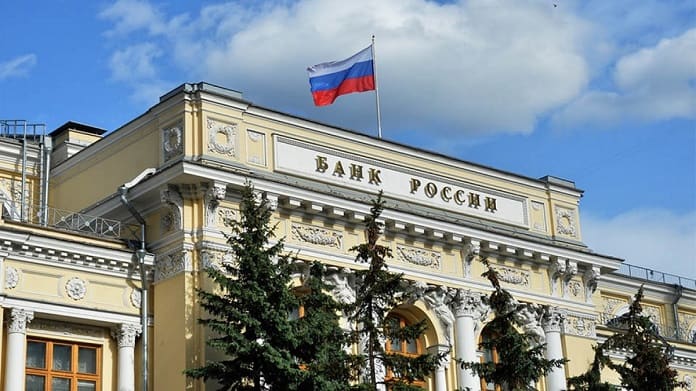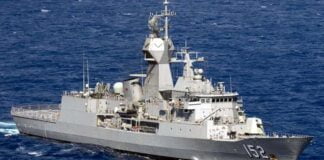Sanctions are a cruel weapon of war. But the imperialist powers that impose them can also face unintended consequences. David Glanz looks at a new book that explores the history of sanctions.
Australia and other Western powers responded swiftly to Russia’s invasion of Ukraine by applying round after round of economic, political and social sanctions.
As The Economist put it, beyond the battlefield “another struggle is raging—an economic conflict of a ferocity and scope not seen since the 1940s, as Western countries try to cripple Russia’s $US1.8trn economy”.
It continued: “Since February America, Europe and their allies have unleashed an unprecedented barrage of prohibitions covering thousands of Russian firms and individuals. Half of Russia’s $US580bn of currency reserves lies frozen and most of its big banks are cut off from the global payments system.
“America no longer buys Russian oil, and a European embargo will come fully into effect in February. Russian firms are barred from buying inputs from engines to chips. Oligarchs and officials face travel bans and asset freezes. America’s ‘KleptoCapture’ task-force has seized a superyacht that may have had a Fabergé egg on board.”
Any hopes that people may have had that sanctions would discipline Putin, end the war and prevent future bloodshed have come to nothing. Instead, sanctions have become a weapon, wielded by the US and its allies as part of the West’s proxy war against Russia.
It’s ordinary Russians who are shouldering the impact on the Russian economy, which is on track to shrink by 6 per cent this year. In the absence of struggle, Russian workers have no way to avoid price rises and product shortages. US academic Michael Alexeev says despite government price controls on essentials like food and gas, inflation is biting. Although many poor Russians in rural areas grow some of their own food, most of what they still need to buy has become more expensive. “Those who don’t grow any food themselves are suffering quite a bit.”
While many Russian oligarchs have been hit with property seizures and face travel bans, the Russian economy has suffered less than expected thanks mainly to soaring gas prices. Russia is on track for a current-account surplus of $US265bn in 2022. To quote The Economist once more: “Full or partial embargoes are not being enforced by over 100 countries with 40 per cent of world GDP. Urals oil is flowing to Asia. Dubai is brimming with Russian cash and you can fly with Emirates and others to Moscow seven times a day.”
As Marco D’Eramo wrote in New Left Review: “The relative inefficacy of sanctions was predictable. If decades of economic warfare had proved incapable of bringing down effectively defenceless regimes such as Castro’s Cuba (by now targeted for over 70 years), Bolivarian Venezuela (30 years) or Khomeinist Iran (42 years of American sanctions, plus around ten years of international measures), it’s difficult to imagine them triggering regime change in a country like Russia, which has been preparing for this eventuality by revamping its industrial capacities.”
In this context, a new book by US academic Nicholas Mulder is timely. Written before the invasion and published earlier this year, The Economic Weapon: The Rise of Sanctions as Tool of Modern War, focuses on the growing role sanctions played in the era of total war from 1914 to 1945.
Civilian deaths
Based on meticulous research, he provides a wealth of detail about debates within the British, French and US ruling classes, in particular, about the development and application of sanctions. A number of conclusions stand out that are useful for making sense of events today.
The first is that there is nothing peaceful or humane about sanctions. So, in late 1916, France and Britain applied sanctions to the areas of Greece loyal to the king, who was sympathetic to Germany. Mulder writes: “Since the population of Old Greece depended on food imports, this pacific blockade caused severe hunger. Civilian mortality in Athens doubled in early 1917.”
The British and French navies also applied a harsh blockade on ships to and from the Ottoman (Turkish) Empire, cutting food supplies to Turkey and the areas it controlled in the Middle East. “Estimates of the total deaths among the inhabitants of Greater Syria between 1915 and 1918 range from 350,000 to 500,000. One historian has estimated that as much as 18 per cent of the population of Ottoman Syria … died during the war.”
Sanctions in the form of trade blockades also wreaked deadly havoc in Central Europe (Germany, Austria and their territories). Between 300,000 and 400,000 people died of blockade-induced starvation and illness in Central Europe. Together with the deaths in the Ottoman Empire and elsewhere, sanctions “were the chief man-made cause of civilian death in 20th-century conflict” prior to World War Two.
It was a preventable tragedy that would be seen again with the imposition of United Nations sanctions on Iraq from 1990 to 2003. The measures, fully endorsed by Australia, cut GDP per head from $US1371 to, at one point, a low of $US241. Some studies, including one published in The Lancet and another carried out by UNICEF, put the number of child deaths due to sanctions at half a million. Whatever the true number, it was a further indication that “humanitarian” alternatives to war-fighting can carry an enormous human cost.
Vain hopes
Despite the deadly impact of blockades during World War One, those who argued for sanctions in the years that followed often did so in the hope that economic and financial sanctions could prevent war, either by signalling the willingness of neutral nations to act or by making war too costly to wage. There was widespread horror at the reality of trench warfare and a determination that it would never be seen again.
In 1919, US President Woodrow Wilson described sanctions as “something more tremendous than war”. He hoped that the threat of their use would bring “a nation to its senses just as suffocation removes from the individual all inclinations to fight … Apply this economic, peaceful, silent, deadly remedy and there will be no need for force”.
Ironically, it was the belief that sanctions were decisive in the outcome of the war (a belief that Mulder challenges) that fuelled support for them as a supposed weapon for peace. British official William Arnold-Forster argued: “We brought the enemy to his knees … This blockade weapon is more indivisible and far more deadly than had formerly been supposed.” Mulder notes: “Belief in the power of the economic weapon had become an internationalist political commitment. And the Allies’ war-winning weapon had one very clear institutional heir: the League of Nations.”
As the victors in World War One, Britain and France ensured that the League of Nations (the forerunner of today’s United Nations) had the right to impose sanctions under Article 16 of its founding covenant in January 1920 (the US did not join the League). These would include “the severance of all trade or financial relations, the prohibition of all intercourse between their nationals and the nationals of the covenant-breaking State, and the prevention of all financial, commercial or personal intercourse between the nationals of the covenant-breaking State and the nationals of any other State, whether a Member of the League or not.”
It appeared to be a powerful weapon. But the deployment of sanctions prevented just two conflicts. In 1921, forces supported by Yugoslavia invaded Albania. Britain threatened to call for Article 16 sanctions and warned of a naval blockade in the Adriatic. Yugoslavia backed down. In 1925, in what became know as the War of the Stray Dog, Greek forces advanced into Bulgaria after a border skirmish. Britain and France threatened an escalating package of sanctions if Greece did not withdraw. Athens bowed to the pressure.
It was one thing for major imperialist powers to wave a big stick at Yugoslavia or Greece. When it came to Italy’s invasion of Ethiopia in 1935-36, the threat of sanctions fizzed. As Mulder writes: “League sanctions did not compel Italy to break off its war, nor did they save the government of Emperor Haile Selassie or the independence of the Ethiopians … What differed in 1935 was that sanctions confronted a relatively large industrialized state that was both ideologically and materially invested in militarism and colonial conquest.” Those who saw sanctions as preventing war were hoping in vain. Just three years later, in 1939, World War Two broke out. The League and Article 16 vanished in a puff of gunsmoke.
This episode underscores a further point—that in practice, sanctions can be imposed only by stronger countries on weaker countries. Far from being an even-handed method of stopping conflict, they are the way that imperialist countries attempt to impose their will, although it doesn’t always work as D’Eramo noted above. It would be a nonsense for, say Cuba, to impose sanctions on the US, or for Timor Leste to impose sanctions on Australia. Sanctions are a weapon of the powerful and, for all Russia’s economic weaknesses, its vast reservoirs of fossil fuels mean it cannot be simply sanctioned into submission.
Aggressive autarky
Mulder’s book makes two further points that are relevant for today—and both demonstrate that sanctions can be a double-edged weapon. The first is that nations which are sanctioned will look to become self-sufficient to survive the external pressure on their economy, postponing but not eradicating the possibility of war. Russia, which faced sanctions for annexing Crimea in 2014, moved to attempt to sanction-proof its economy. In 2013, for example, Russia imported about half of its food—today it is self-sufficient in basic food supplies and has become a significant exporter of grains and wheat.
In fact, far from preventing war, sanctions can lay the basis for future conflicts. Mulder writes about sanctions imposed in 1935-36 on Germany, Italy and Japan: “The episode accelerated the search for a very specific form of economic autarky: resilience against sanctions or a blockade that cut off imports of raw materials. This defensive reaction unleashed a highly unstable dynamic. Since none of these three countries—united after 1936-37 through the Anti-Comintern Pact—was self-sufficient in crucial raw materials, their search for immunity against blockade strengthened their inclination toward territorial conquest.
“As their strategic ambitions grew, the threat and application of new sanctions only increased the urgency of securing resources at all costs. Economic pressure, meant to restrain aggressive expansion, now began to accelerate it. A vicious cycle therefore materialized in the second half of the 1930s as sanctions and self-defeating bids for autarky reinforced each other.” The result was World War Two.
Western sanctions on Russia have already led it to greater economic collaboration with China and India. But Putin, blocked on his western border by NATO, may look for fresh opportunities to Russia’s south, among the former Soviet republics, for example. Potential conquests or annexations might look attractive, especially as the US and its allies have no major interests in the region, which they acknowledge as part of Russia’s sphere of influence.
Just one month before the invasion of Ukraine, Russia sent troops into Kazakhstan to prop up a friendly dictator—and there was not one word of complaint from the West. Ukraine has strategic and political significance, but it also has coal and wheat. Kazakhstan, on Russia’s border with China, is the world’s largest uranium producer and is a significant source of oil, coal and natural gas. The country also has the world’s biggest reserves of chrome ores and is second largest in terms of silver, third in manganese ores, fourth in zinc and fifth in iron ore. At some point, Putin or his successor may decide there are other easier prizes than Ukraine.
Triggering radicalisation
The final point that flows through the book is that sanctions can lead to working class radicalisation. Mulder notes that one of the aims of sanctions was putting pressure on the population of the sanctioned country, to encourage them to revolt against their own government. But the imperialist sanctioners could find themselves releasing forces that they regretted.
It was a point that even Winston Churchill, Britain’s Secretary of State for War from 1919, understood, arguing that with blockades of Germany and Russia “we have no means whatever of influencing or guiding the course of events in Europe except by starving everybody into Bolshevism”. He continued that continuing post-war sanctions on Germany would “throw Germany into the arms of the Bolsheviks and so give the Soviet Government of Russia a fresh lease on life”. Another MP noted: “This Bolshevist germ becomes very infectious in countries which are suffering food shortage.”
Feminists were prominent in mobilising against the continuation of sanctions on Germany and Austria after 1918. The British branch of the Women’s International League for Peace and Freedom organised a rally in central London that attracted thousands, condemning the blockade as “extermination which begins with children”.
Meanwhile, in January 1919, British socialists started the “Hands Off Russia” campaign, demanding the end of sanctions (including armed invasion) aimed at destroying the new workers’ state. In Germany later that year, the experience of suffering under sanctions meant workers rejected the country participating in economic sanctions against Russia. The paper of the main socialist party, the SPD, wrote that the proposal was “criminal and unethical to a special degree”. The SPD Foreign Minister, Hermann Müller, spoke against sanctions, saying: “We know on the basis of our experiences that Bolshevism is fed precisely by such coercive measures.” The West’s campaign to sanction Russia lost momentum from then on.
Today, socialists condemn the Russian invasion of Ukraine and call for Putin to withdraw his troops. But we also condemn the way our rulers, including the Australian government, are arming Ukraine to fight a proxy war on the West’s behalf. Sanctions are not an alternative to that war—on the contrary, they form an important element of the NATO offensive. We need to mobilise not only against the military death and destruction, but also against the sanctions that are wrecking the lives of Russian workers and their families. This book is full of lessons that we will help us in that fight.
The Economic Weapon: The Rise of Sanctions as Tool of Modern War by Nicholas Mulder (Yale University Press, 2022).






